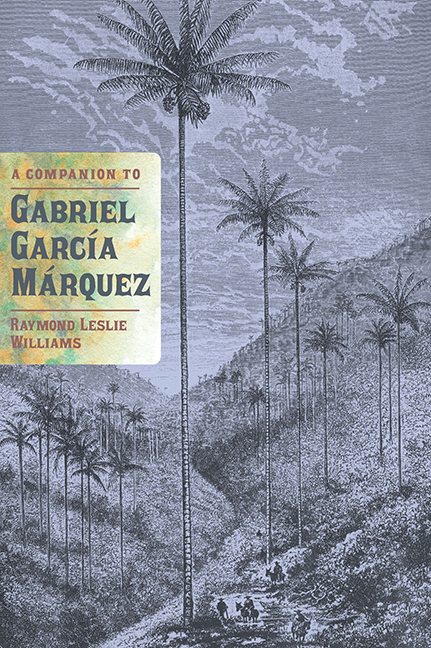Book contents
- Frontmatter
- Dedication
- Contents
- Abbreviations
- Foreword
- 1 García Márquez, the Modernists, and the Boom
- 2 Cien años de soledad and the Macondo Cycle
- 3 El otoño del patriarca and the Political Writings
- 4 Postmodern Gestures: El amor en los tiempos del cólera, Crónica de una muerte anunciada, and La increíble y triste historia de la cándida Eréndira y de su abuela desalmada
- 5 Recent Writing
- 6 Epilogue
- Guide to Further Reading
- Select Bibliography
- Index
3 - El otoño del patriarca and the Political Writings
Published online by Cambridge University Press: 26 May 2022
- Frontmatter
- Dedication
- Contents
- Abbreviations
- Foreword
- 1 García Márquez, the Modernists, and the Boom
- 2 Cien años de soledad and the Macondo Cycle
- 3 El otoño del patriarca and the Political Writings
- 4 Postmodern Gestures: El amor en los tiempos del cólera, Crónica de una muerte anunciada, and La increíble y triste historia de la cándida Eréndira y de su abuela desalmada
- 5 Recent Writing
- 6 Epilogue
- Guide to Further Reading
- Select Bibliography
- Index
Summary
García Márquez has been a politically involved and politically motivated writer since the 1950s. Much of his writing has implicit or explicit political content; there is a continuity to be found in the political themes of Los funerales de la mamá grande (Big Mama's funeral, 1962), El otoño del patriarca (The Autumn of the Patriarch, 1975), and El general en su laberinto (The General in his labyrinth, 1989). This continuity can be seen as an outline of García Márquez's career as a political writer concerned with issues such as autocratic rule, the nature of power in general, and specific abuses of power in particular. He grew up in the one and only region of Colombia that has ever been dominated by foreign capitalists, and the young García Márquez heard stories about their presence from an early age. Because of the poverty of this Caribbean region of Colombia, García Márquez witnessed and experienced social and economic inequity, some of the most dramatic in Latin America. Another key factor in the development of his political vision has been his age: he belongs to a generation of Latin American intellectuals who were markedly influenced by Marxist and neo-Marxist thought, as well as by the writings of Jean-Paul Sartre.
For many readers, the essence of García Márquez seems to be primarily that of a magic realist whose works are not significantly political or social in emphasis but rather offer an escape into the fantastic and the exotic. Nevertheless, he has spent a lifetime writing politically critical journalism and participating in a variety of political processes in Latin America. In addition to the several factors already mentioned, the broader life story behind the formation of his political vision includes: his 1955 book Relato de un náufrago (Story of a shipwrecked sailor); his travels in 1957 behind the ‘Iron Curtain’ of Eastern Europe; his own direct experience; his work for Cuba's Prensa Latina news agency as a journalist posted to Bogotá, Cuba, and New York in the late 1950s and early 1960s; the publication of La mala hora and Los funerales de la mamá grande in 1962; his founding of the leftist magazine Alternativa in Bogotá in 1974; his publication of El otoño del patriarca in 1975; his publication of Operación Carlota (his essay on Cuba's role in Africa) in 1977;
- Type
- Chapter
- Information
- A Companion to Gabriel García Márquez , pp. 77 - 100Publisher: Boydell & BrewerPrint publication year: 2021



